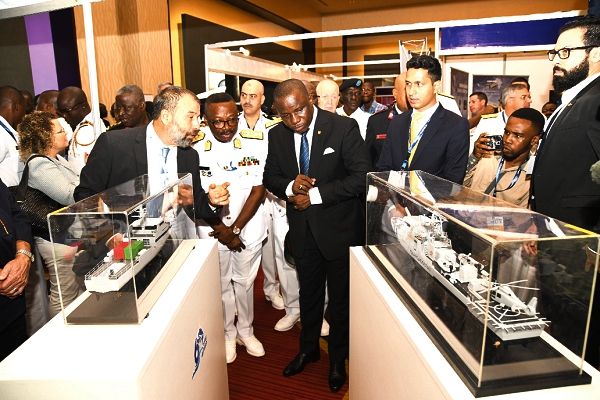
Goverment collaborates with stakeholders to reduce security threats on territorial waters
The government is collaborating with stakeholders in the maritime industry at both the regional and the global levels to reduce security threats on the country’s territorial waters.
According to the Minister of Defence, Mr Dominic Nitiwul, threats to maritime security transcended borders and had the propensity to affect international trade, as an attack on one coastal nation was a threat to all nations.
Speaking at the opening session of a two-day International Maritime Defence Exhibition & Conference (IMDEC) in Accra yesterday, he said Africa’s quest to have a peaceful and sustainable continental free trade area cannot be successful without a secured maritime domain.
Although Ghana’s territorial waters were safe, the Gulf of Guinea in general still had challenges with issues of armed robbery and piracy, hence the need for stronger collaboration among all stakeholders in the maritime sector, the minister added.
Conference
The event was on the theme: “Empowering regional collaboration to enhance maritime security and regional development in the Gulf of Guinea”, and organised by the Great Minds Events Management Group of Dubai, the UAE, in partnership with the Ghana Navy, as part of activities marking the 60th anniversary of the Ghana Navy.
It is aimed at discussing ways to secure the increasingly volatile marine and coastal waters in Africa, as well as stabilise economic advancement and security in the Gulf of Guinea.
More than 300 delegates and exhibitors from 35 countries, including the United States of America, Germany and Malaysia, and about 20 Naval chiefs from Africa are participating in the conference.
Among issues being discussed are illegal oil-bunkering, piracy, unregulated and unreported fishing, smuggling, human and drug trafficking, illegal bunkering and crude oil theft.
Participants will also exchange ideas, share information, build capacity and explore modern technology on how to curb maritime crimes.
Cooperation
Mr Nitiwul said since 39 out of the 55 member countries and states of the African Union (AU) had coasts, with only 16 of them being landlocked, concerted efforts were required of African governments to navigate the future together through Agenda 2050 “where we must have what we call the African Integrated Maritime Strategy, an inter-agency cooperation to coordinate a combined operation along the land, sea and air forces of Africa and beyond”.
Chief of Naval Staff
The Chief of the Naval Staff, Rear Admiral Seth Amoama, said the Ghana Navy had engaged its counterparts within the West African sub-region on cross-border cooperation and flag shows, including capacity building, to address the maritime challenges.
He noted that although the process of implementation of a signed Yaounde Code of Conduct made by the countries within the gulf to mitigate maritime crimes had been slow and fraught with challenges, the various zones had committed themselves to the implementation of the code.
Similarly, Rear Admiral Amoama said, there had been collaborations beyond the African region, with the Navy of member countries undertaking joint exercises with their foreign counterparts to improve interoperability.
He said managing maritime security was challenging and, therefore, required collaboration among the broad spectrum of global maritime stakeholders.
Vulnerability
The Conference Director at Great Minds Events, Ms Khalila Baldwin, said unsafe and unmonitored anchorage areas were often vulnerable to threats at sea.
She expressed the hope that the IMDEC would further enhance dialogue among the stakeholders to improve maritime security within the Gulf of Guinea.
